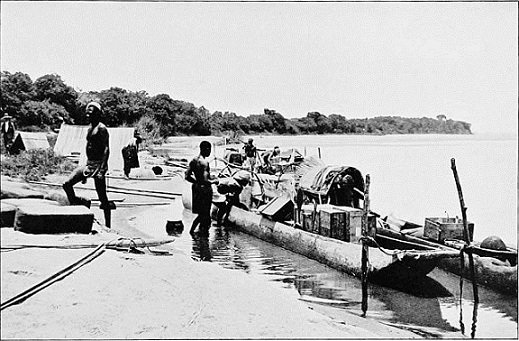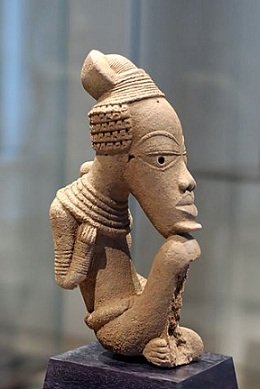ADSactly History : History Of Northern Nigeria [Part 3] - Nupe In The Pre-Colonial Era
In our first and second episode of the history of Northern Nigerian, we discussed about the Hausa/Fulani and the Kanem-Bornu ethnic groups respectively - we also looked at their cultural heritage in the pre-colonial era. Obviously, these are not the only ethnic groups in Northern part of Nigeria. Here, we will look at another ethnic group; the Nupe; their cultural and socio-political organization in the ancient time.

Nupe Ethnic Group
Even though the Nupe ethnic group is seen as minority in the Northern part of Nigeria, their impact and achievements in Nigerian history and in the black continent of Africa is something that is worthy to be mentioned. Nupe is among the few ethnic groups that have been said to have historic affiliations and links with both Kanem-Bornu and the Hausa/Fulani tribes. During the pre-colonial times, Nupe ethnic group was not only found in the Northern part of Nigeria, even the Middle-belt of Nigeria was home to Nupe people.
It might interest you to know that even the Yorubas (in the South-western Nigeria) have historic affiliation with Nupe. If you can remember when we talked about the Yoruba history, we mentioned that Oranmiyan (one of the sons of Oduduwa) founded the old Oyo (which was the capital of Yoruba land). Oranmiyan was believed to have gotten married to one of the daughters (Elempe) of one of the most powerful kings of Nupe. The son of Oranmiyan and Elempe later became the king of the old Oyo empire. This is to let you know that Nupe and Yoruba shared a common ancestry.
The predominant religion in Nupe is Islamic religion, though by origin, they were majorly traditionalists. The same Jihad (Holy war) that was led by Usman Dan Fodio which led to the Islamization of Kanem-Bornu also brought Islamic orthodoxy to Nupe land during the late 18th century to the early 19th century.
History of Nupe Ethnic Group
Just like the other ethnic groups in Northern Nigerian (Hausa/Fulani, Kanem-Bornu) that we have surveyed, Nupe ethnic group has many versions of the history relating to their origin. Even though many of them look similar, we will look at the ones that have been generally accepted by Nupe history scholars.
The Version of Idah
It has been a popular belief among Nupes that the founder of Nupe was Tsoede (also called Edegi). Tsoede lived in Idah (the present day Kogi state; North Central Nigeria) in the early days of his life. During his stay in Idah, he faced a lot of contention with the people because of his "over-strict" nature, and at a point, he was even arraigned before the local court in Idah.
Tsoede was a prince of Idah at that time but all these contentions made him to flee from Idah and established a small community along Niger river and installed himself as the king (ETSU) of Nupe land. The title "ETSU-Nupe" was later adapted throughout the Nupe land as the highest administrative head - even till this present day, ETSUs still wield tremendous amount of power.

It was from the areas along the Niger river that other Nupe lands were formed and presently, Nupe people are found in some major Northern and Middle-belt states in Nigeria, like FCT (Federal Capital Territory), Kogi state, Kwara state, Benue state. Asides Nigeria, some other places in Africa and the wider world have small native Nupe speakers, like Knowle (Solihull, England) ref.
The Version Of Egypt
This is also a migratory account of the origin of Nupe. This version is heavily opposed by some Nupe people, but some still believe it till now. It is believed that the founder of the Nupe ethnic group migrated from the ancient Egypt and Journeyed through the Sahara till they found their way to the Northern part of Nigeria. According to the version of Egypt, during the ancient time (around 1700 BCE), the pharaoh of Egypt led some contingents to the Northern part of Nigeria (where the present day Nupe is located).
Another oral tradition of the same Egyptian version explained that during that time, Nupe tribe also covered parts of West African sub-region. The ancient Nupe people (called "KinNupe") practised Nok culture - this was before the introduction of Islamic orthodoxy. This can also explain some cultural similarities between the ancient KinNupe and the Egyptian people. As against some Hausa/Fulani that believe creationist myths and legends (like the creation of man from drop of milk), the major history of the Nupe people centered around the migratory account.

Nupe Administration and Socio-political organization
During the pre-colonial time; and even till this present time; the administration of the entire Nupe land is centered on the ETSU-Nupe (king of Nupe). ETSU-Nupe does not only have administrative functions over the land of Nupe but religious functions as well. As a matter of fact, during the ancient times, people saw ETSU-Nupe as divine being and some people even reverenced and worshipped him. The people of Nupe were ruled by the words of the ETSU.
However, even with this so much power wielded by the ETSU-Nupe, his powers are not absolute. There are people that the ETSU-Nupe was answerable to; like the titled nobilities. In the land of Nupe, during the ancient times, there were many titled nobilities that oversaw the activities of the ETSU-Nupe, example of them are Maku, Kpotuh and the Shabi, which have remained till this present time.
Asides the titled nobilities, each province in Nupe land had their own administrative head (called Zitzu). The Zitzus were selected by the ETSU-Nupe and they were answerable to him, while he was answerable to the titled nobilities. A very unique feature of the socio-political organization of the Nupe land is; they believed very well in hierarchy of power and this feature has remained even till this present time.
Authored by @samminator
Click the coin below to join our Discord Server
)
Very interesting, @samminator. I must confess that with your posts I have learned a bit about African ethnic groups. I think I told you that the only ones I knew were the Yorubas and I would never have thought that there were other groups. As for the Nupes, they also have marks on their faces like the Yoruba? A few days ago I read how some parts of Africa were very strict, even these days, with their ancestral norms and culture, which they even keep almost intact. How do they do this? I imagine that these groups must remain very isolated from the big cities, or on the contrary, they coexist with people from other groups, perhaps giving interesting and multicultural mixtures! Thank you for sharing your work! ;)
I'm really glad you found the post educative. Actually, having tribal marks is very common in Nigeria. Even the Igbos, Yorubas, Hausas etc have their own tribal marks, but you can easily differentiate them.
Yes, some places have very strict traditional practices. For example, In some parts of Igbo, there's a particular festival called mmanwu festival. A particular dreaded masquerade normally graced the festival once a year, but only men and titled women are permitted to see the masquerade.
Thanks a lot for reading, Nancy
I have already told you, @samminator, that I think it is a magnificent effort to spread the knowledge of the ethnic-cultural diversity of Africa what you are offering us in your work.
As far as the Nupe ethnic group is concerned, I didn't know it at all. The hypothesis of its Egyptian origin seems to me very striking. I regret that the original religious cultures of these peoples have been supplanted by a foreign hegemonic religion. I was also struck by the type of social organization, which, although hierarchical in structure, seems to offer the possibility of decentralization and social controls.
Thank you and greetings, @samminator.
Thanks for the kind words buddy. Yeah, even in some parts of Nigeria; apart from Nupe; their traditional religion has been suppressed by foreign religion, but this has not taken away the richness of their cultural heritage.
Thanks for coming around buddy
Am glad to read this post on the history of Nigeria once again. I didn't know until now that Yorubas have a relationship with the Nupe through Elempe.
I think one of the major problem we have in this part of the world in the past is that we lack proper recording. But we are glad that Nigeria is getting her footings as a result of those that took a serious step to preserve the history.
Thanks to @samminator and Adsactly community for helping Nigeria with her history.
Exactly buddy. This is absolutely truism. I also think history should be fully integrated into the curricula of our schools. This will expose people to their root quite early in life
Thanks for the comment buddy
Hi, @adsactly!
You just got a 0.3% upvote from SteemPlus!
To get higher upvotes, earn more SteemPlus Points (SPP). On your Steemit wallet, check your SPP balance and click on "How to earn SPP?" to find out all the ways to earn.
If you're not using SteemPlus yet, please check our last posts in here to see the many ways in which SteemPlus can improve your Steem experience on Steemit and Busy.
This is probably the ethnic group I knew or had heard the least about. And yet, they seem to have as much import in the development of Nigerian culture as any of the other major groups.
As I continue reading the series I can't help thinking about the movie Black Panther and the global impact it had last year. I wonder what cultures Africans see represented in the movie and how the possibility of an idyllic, powerful, and advanced Africa plays in the minds of its people.
With such a rich history, with such an ancient culture of so much tradition, art and philosophy, why has not that dream come true?
What role have empires play? Or religions?
I know some territories are mostly muslims, others christians. Is there a correlation between religion and development? conflicts or lack thereof?